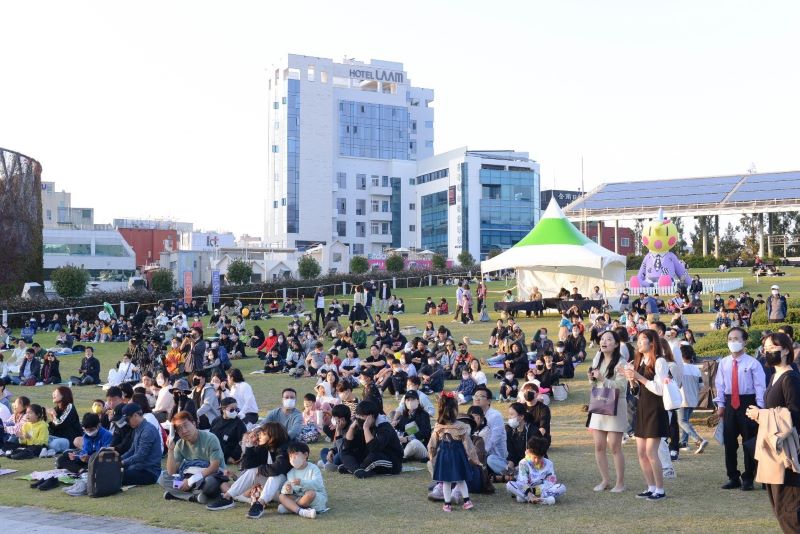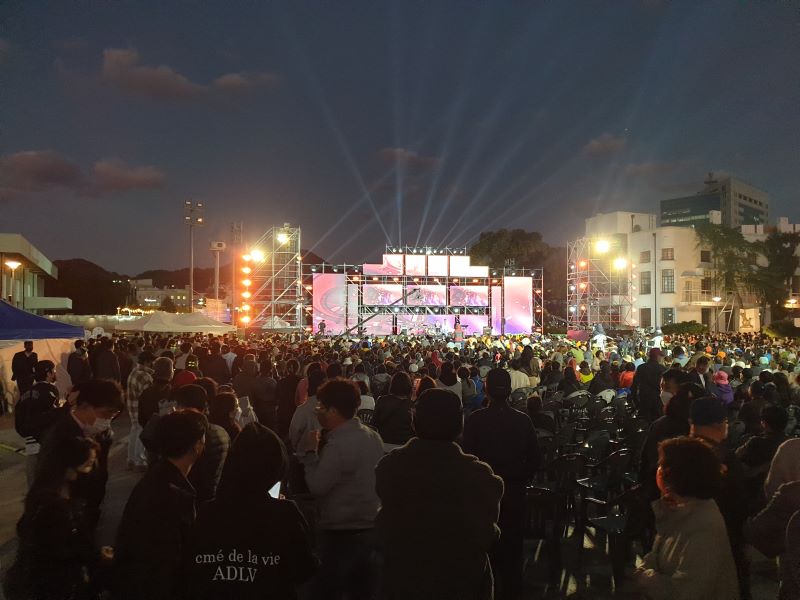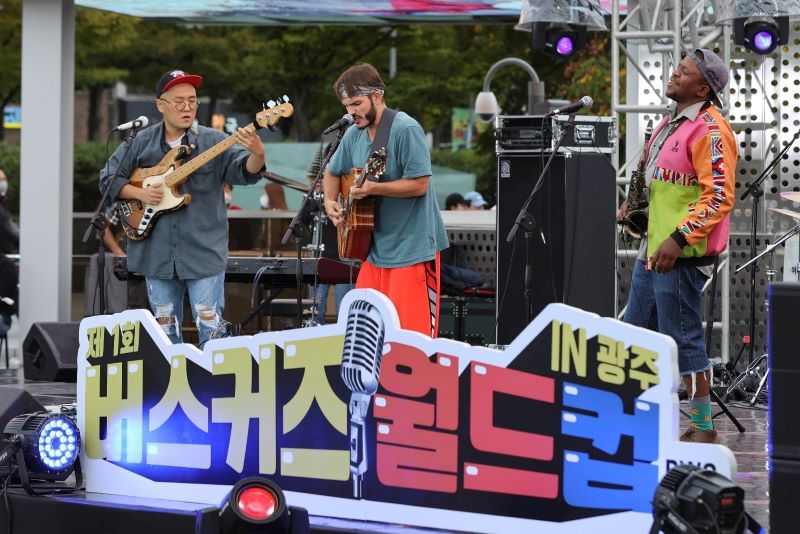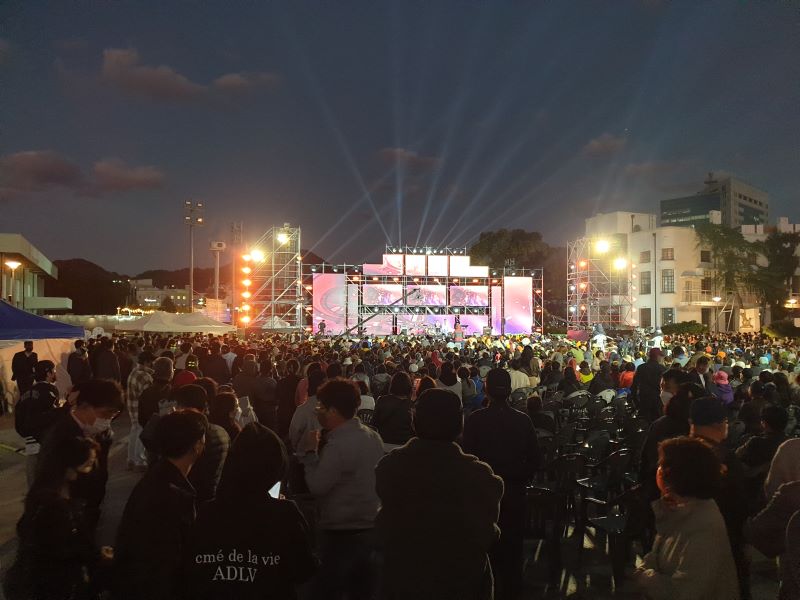Gwangju to Host Busking World Cup 2023
By Gwangju News
The first annual Gwangju Busking World Cup, which took place in October 2022 was a resounding success. It boosted the international profile of Gwangju and filled the downtown area with energetic and lively international performers. Best of all, it gave the citizens of Gwangju the opportunity to interact with performing artists from all over the world.
The Gwangju News had the opportunity to interview Kim Seong-houn, the general manager of the 2023 Gwangju Busking World Cup, about this year’s upcoming festival. Kim and his team were kind enough to shed some light on what has been going on behind the scenes in preparation for this October’s GBWC.
Gwangju News (GN): Thank you so much for taking the time to do this interview. First of all, for those who do not know, what is the Gwangju Busking World Cup?
Kim Seong-houn: The Gwangju Busking World Cup is a competition and festival at the same time, where musicians from all over the world gather here in Gwangju to understand and exchange each other’s music and compete in good faith.
GN: Last year’s event was a huge success. What do you think was the best part on last year’s Gwangju Busking World Cup?
Kim Seong-houn: From the point of view of staff and also as an audience member, it was nice to listen to all the different genre of music that you can’t really listen to here in Korea. On the other hand, we managed to create a tour program for the buskers to enjoy the history and nature of Gwangju and South Jeolla Province, This program really satisfied the buskers. There were lots of tasks to manage for this tour program, but after we saw their faces after the tour was completed, our team had no regrets for the work put into doing this.

GN: I understand that some of the buskers from last year will be coming back this year. Is that correct?
Kim Seong-houn: For now, we cannot say. We are at the screening and scoring stage right now (June 1–21), and cannot confirm who will be selected as the 64 finalists.
GN: How is this year’s contest going to be bigger and better than last year’s?
Kim Seong-houn: The numbers of applications for the Gwangju Busking World Cup has definitely increased over that of last year. In particular, overseas musicians’ applications have increased two-fold compared to last year!
We selected 121 teams as finalists last year, but this year we are cutting that in half. So, this year, 64 teams will be competing on stage. We reduced the numbers of artists who will perform on stage to allow the artists to focus more on performing and less on competitiveness. On the other hand, the 64 teams will have more benefits, including up to three round-trip tickets per team and aid with accommodations. Besides the competition itself, the audience will be presented with excellent domestic and international invited performances. We are bringing professional world music performing teams for the audience so that they can enjoy music aside from the competition.
As for the finalists, we are giving an opportunity to the 2022 winners to perform in other festivals, events, or elsewhere in the music market, not just ending with getting an award from the Gwangju Busking World Cup. We are trying to help them grow as musicians. For this year’s winners, eight teams will be awarded, and the top two teams will be given support to perform in music festivals in other countries. It will be a great chance for them to advance as musicians.
GN: Bringing artists from all over the world has got to be a massive task. What are some of the logistical challenges you have had to overcome so far?
Kim Seong-houn: For last year, which was our first-ever competition, there was difficulty in promoting the event to potential overseas participants. So, we would mainly approach buskers on the street with information on the Gwangju Buskers World Cup. But this year, we have appointed Lee Jung-hun as head artistic director, who has overseas networks such as with overseas music festivals and music markets, to develop our busking event into a global music competition and festival.

GN: Last year, it seemed to me that several different festivals were taking place at the same time that the Busking World Cup was taking place at the Asia Culture Center. While some of these (like the food festival) created a synergy, I feel like the other music festivals created a little confusion, and it would have been better if the Busking World Cup had exclusive rights to use the ACC grounds for musical performances during that time. What are your thoughts on this?
Kim Seong-houn: The ACC is a national institution established by the Ministry of Culture, Sports, and Tourism (MCST) of Korea, and the organizer of the Gwangju Busking World Cup is the Dong-gu District Office of Gwangju. We are cooperating with each other, but we believe we have different rules as a governmental institution and as a local government. This year we are also using part of the ACC facility, and in order to develop into an urban music festival, I think it should naturally be operated in the square and in the city center so that more people can enjoy it.
GN: The Gwangju Busking World Cup is a competition. Could you let us know what the judges are looking for when they are picking the finalists and the winners?
Kim Seong-houn: As the screening criteria are specified on the website, musicality, skill and talent, originality, and stage manners are the criteria for the screening.
GN: As opposed to the regular singing festivals that take place around the country, busking creates a special atmosphere and connection with the audience. Could you try to describe this special atmosphere?
Kim Seong-houn: Busking usually is found in places where pedestrians walk by; that means it is quite easy to listen to them. On your way home after work, maybe after a nice dinner with your partner, or even when you are sad and down, and just need to get out of the house, you’re most likely to meet buskers singing and performing on the street. Performing in close proximity, buskers and their audience talk freely, new listeners comes and previous ones move on. This vibe of free participation creates a special atmosphere.
For the 2023 Gwangju Busking World Cup, the audience will be able to enjoy music on the street, transcending nationality, race, generation, gender, religion, and ideology.

Seong-houn)
GN: Besides its entertainment value, the Gwangju Busking World Cup is an excellent medium for cultural exchange. Could you talk about some of the benefits to the Gwangju community of inviting people of so many different cultural backgrounds to the city?
Kim Seong-houn: We believe that within music is contained a nation’s culture that has been formed over many years. As well, music is also sung as a universal language. Introducing many different cultures via music to the people of Gwangju will help all of us in the understanding of other cultures, creating respect, and wiping out discrimination. It won’t happen in one day, but that is our long-term goal.
GN: When the festival is over and the buskers go home, what do you hope they will say about Gwangju?
Kim Seong-houn: We hope that they will remember Gwangju as a good place to perform, as a charming city, and as a city that they want to come back to.
From last year’s event, we could follow the applicants’ experiences on their social media pages. Though they might not have contacted us directly, we could see from their posts how special this experience was to them. It made us feel blessed. All we want from our team is to just make them happy and have only good vibes about Gwangju.
GN: Thank you so much for taking the time to do this interview! We really appreciate it and are excited to see what’s in store at this year’s GBWC!
Interviewed by William Urbanski, Managing Editor, Gwangju News.
Photographs by William Urbanski and Kim Seong-houn.







